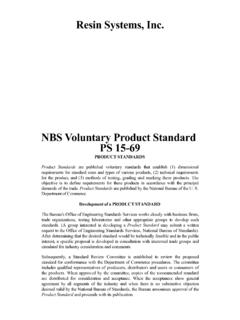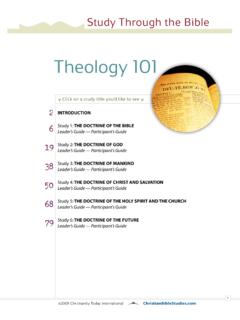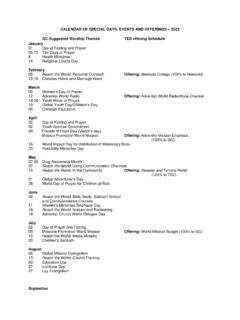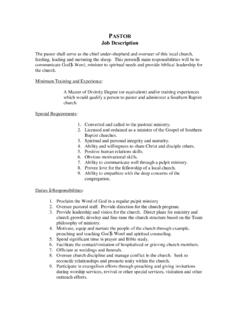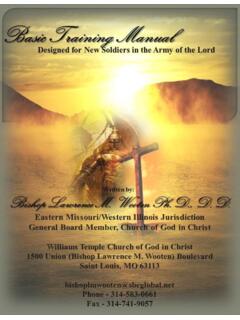Transcription of Develop a Discipleship Plan - Clover Sites
1 DEVELOPING AN ADULT Discipleship PLAN IN A LOCAL CHURCH. Discipleship BASICS. The following ideas are designed to provide practical help in developing a church strategy for making adult disciples. Discipleship PRINCIPLES. Six general principles can help in designing a Discipleship program. 1. Plan with the end in mind. Determine what characteristics you believe are marks of a maturing disciple. 2. Evaluate current spiritual maturity. Determine where persons are now in their spiritual journeys. 3. Design a plan. Develop a process to help persons grow from where they are now toward the characteristics you believe mark a maturing disciple. Overall your goal is to move persons from being nonbelievers to being maturing disciples.
2 4. Spiritual growth is a life-long journey. Guide each person to determine the next step he or she should take in his or her spiritual journey. Persons do best when they can see one small step at a time. 5. Discipleship is relational. Persons learn and grow from more mature believers whom they know and trust. Friendships are the conduit through which Discipleship flows. 6. Discipleship is reproducible. Guide persons to grow in spiritual maturity in such a way that as they grown, they can help others grow. Plan with the End in Mind The goal of Discipleship is disciples that are maturing in their faith. As you think about what characteristics you believe are marks of a maturing disciple, consider the following characteristics: 1.
3 Spirit-filled Living (Eph 5:18). Christ-centered living evidenced by persons who: Love God (Matt 22:36-40) expressed in worship and holy living Love Others (Matt 22:36-40) expressed in fellowship and forgiveness 2. Spirit-gifted Serving (Rom. 12:4-6a). Ministry to others 3. Spirit-empowered Witnessing (Acts 1:8). evangelism 4. Multiplying Disciples (2 Tim 2:2). Making reproducible disciples who can make disciples of others Evaluate Current Spiritual Maturity From your own prayerful observation, you can gain much insight about the level of spiritual maturity among believers in your church. The Spiritual Growth Assessment Process . (downloadable at ) is a useful tool to help persons evaluate their current spiritual maturity.
4 Design a Plan and Process Discipleship is a process. In the big picture, Discipleship is a process of moving persons from being nonbelievers to being maturing disciples. Although the steps after conversion are not always taken in order, it is helpful to consider the process in smaller steps. Steps in Becoming a Maturing Disciple Step 1: Nonbeliever to Believer Step 2: Believer to Church Member Step 3: Church Member to Growing Christian (Spirit-filled Christian). Step 4: Growing Christian to Serving Christian (Spirit-gifted Service). Step 5: Serving Christian to Witnessing Christian (Spirit-empowered Witness). Step 6: Witnessing Christian to Multiplying Christian (Disciple-maker).
5 Ask yourself, does our church have a plan or process in place to help persons take each of these steps? Discipleship METHODS AND MEANS. INVIDUAL BELIEVER'S VIEWPOINT. The following means are the most helpful for spiritual growth: 1. Spiritual Disciplines (2 Tim 2:3-7). Daily Quiet Time Prayer: 1) for self, 2) for others and 3) with fasting Scripture: 1) reading, 2) study and 3) memorization 2. Discipleship Groups (closed, Discipleship small groups). personal growth: include topics such as building a relationship with God, having a quiet time, how to study the Bible, strengthening family life, and personal finances. Training for service: include topics such as discovering spiritual gifts, training for a specific ministry, teacher training, and evangelism training.
6 CORPORATE (CHURCH) VIEWPOINT. Following are the methods generally used in churches to make disciples. They are listed in increasing levels of involvement and spiritual growth: 1. Pulpit / Preaching Biblical preaching will help persons take the first steps in spiritual growth and preaching can motivate persons toward spiritual growth. However, preaching does not provide relationships, personalized teaching, or accountability that are necessary for the next steps in Discipleship . 2. Sunday School (open, small-group Bible studies). This is for foundational Discipleship through Bible study and relationships with other Christians. If you try to use Sunday School for more in-depth Discipleship , the groups become closed and you limit your potential to reach and assimilate new people.
7 3. Discipleship Groups (closed, Discipleship small groups). Closed, small groups that meet for a set time for a particular study are the most effective way to facilitate spiritual growth through teaching, relationships, and accountability. 4. One-on-one Mentoring or coaching can provide intense personalized teaching and accountability. One-on-one approaches have the following weaknesses: 1) in growing churches, there are often not enough leaders for one-on-one training, and 2) in small groups, the relational interactions help persons to learn from one another as well as from the teacher. 5. Ministry Involvement The maximum spiritual growth occurs when persons put into action what they have learned by being involved in ministry or evangelism .
8 ALIGNING CHURCH PROGRAMS. As you disciple persons, most will move through church programs in the following order of increasing commitment and growth potential: 1. Worship service 2. Sunday School (open, small-group Bible study). 3. Discipleship Group (closed, Discipleship small groups). 4. Ministry team (place of service). 5. Witnessing team ( evangelism ministry). DESIGNING A Discipleship PLAN USING SMALL GROUPS. Approaches to making disciples through closed, small groups fall into two broad categories: 1) systematic and 2) nonsystematic. A systematic approach provides a clear pathway for persons to follow as they grow in their faith. The CLASS system at Saddleback (101, 201, 301, 401) is a well-known example of a systematic approach.
9 A nonsystematic approach is nonlinear and provides a variety of options for spiritual growth. SYSTEMATIC PLANS. The following table shows two possible systematic approaches which use materials from LifeWay Christian Resources or the North American Mission Board. Step in the Process Individual LifeWay Courses Growing Disciples Series Believer -> Survival Kit for New The Call to Follow Christ Church Member Christians Church Member -> Experiencing God Abide in Christ Growing Christian Pray in Faith Live in the Word Fellowship with Believers Growing Christian -> Jesus on Leadership Minister to Others Serving Christian Serving Christian - > Share Jesus without Fear Witness to the World Witnessing Christian FAITH evangelism The NET evangelism Witnessing Christian -> MasterLife MasterLife Mutiplying Christian Growing Disciples Series This series of studies is based on the six disciplines of MasterLife.
10 Unlike MasterLife it is divided into number of six week studies and is a less intensive study than MasterLife. The studies do not have to be taken in any order, except that The Call to Follow Christ, a seven-week study, is designed to be completed first. MasterLife and MasterBuilder . MasterLife is a systematic approach which focuses on spiritual disciplines. MasterLife seeks to produce growing, ministering, witnessing, and multiplying disciples. It deals with more than one aspect of Discipleship at a time. MasterLife is made up of four six-week studies designed to be studied in order: The Disciple's Cross, The Disciple's Personality, The Disciple's Victory, and The Disciple's Mission.






